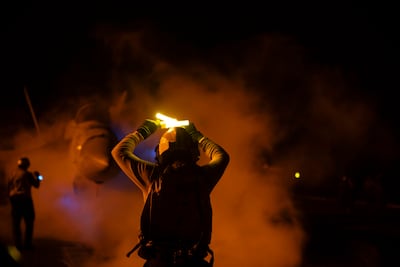Live updates: Follow the latest news on Israel-Gaza
The US and UK struck eight Houthi military sites in Yemen on Monday, the Pentagon said, in the latest attempt to stop the Iran-backed rebel group from launching attacks on shipping in the Red Sea.
A barrage of about 30 Tomahawk land-attack missiles, precision-guided munitions and drone strikes hit Houthi weapons-storage facilities and missiles, a senior US military official said.
British fighter jets dropped precision-guided bombs on two sites near a Sanaa airfield, in what was the UK's second involvement in anti-Houthi strikes.
“We definitely feel that the strikes we have taken tonight … have removed significant Houthi capability,” the US official said, adding that the targeting was “specific” and designed to avoid the risk of civilian casualties.
The official also said the targets were chosen to “avoid escalation”.
“We are not at this time expanding beyond that target set,” the official said.
A senior US official told reporters that the Houthis had conducted at least 33 attacks on commercial shipping since November. About 15 per cent of global trade went through the Red Sea but several major cargo companies have now rerouted ships around the southern tip of Africa to mitigate risks.
The Houthis have vowed to step up strikes even as US-led bombing missions continue.
Monday's military action was the eighth US-led strike on the Houthi rebels since military operations against the group began on January 11, despite President Joe Biden admitting the raids are failing to deter aggression.
A Houthi social media channel said 18 air strikes were launched, most of them on Sanaa and the surrounding area.
It warned that “these attacks will not go unanswered and unpunished”.

In its second such strike, the UK's Royal Air Force used four Typhoon FGR4 fighter jets to drop Paveway IV munitions on Yemen.
Britain said the two sites hit were "being used to enable the continued intolerable attacks" against civilian shipping.
UK Foreign Secretary Lord Cameron said action to curb Houthi firepower would continue, despite the initial strikes failing to prevent 12 more attacks on shipping.
“These attacks are illegal, they are unacceptable," he said. "What we've done again is send the clearest possible message that we will continue to degrade their ability to carry out these attacks."
A joint statement from the US and UK said that Australia, Bahrain, Canada and the Netherlands assisted in the “additional round of proportionate and necessary strikes against eight Houthi targets”.
“Today’s strike specifically targeted a Houthi underground storage site and locations associated with the Houthis’ missile and air surveillance capabilities,” the statement read.
The Houthis, who control much of Yemen, say they are trying to hit ships travelling to Israel in response to its war with Hamas in the Gaza Strip.
But many of the ships being attacked have no connection to Israel.
The US, alongside several countries including the UK, in December launched a maritime operation called Operation Prosperity Guardian to secure the Red Sea waterway against Houthi attacks.
“Let us reiterate our warning to Houthi leadership: we will not hesitate to defend lives and the free flow of commerce in one of the world’s most critical waterways in the face of continued threats,” the statement said.
The strikes against the militants in Yemen is “another blow to their limited stockpiles and ability to threaten global trade”, UK Defence Secretary Grant Shapps said in a post on X.
The White House said Mr Biden and UK Prime Minister Rishi Sunak “discussed ongoing Iranian-backed Houthi attacks against merchant and naval vessels transiting the Red Sea” in a phone call earlier on Monday.
“They reiterated their commitment to freedom of navigation, international commerce, and defending mariners from illegal and unjustifiable attacks,” the White House said.
Earlier on Monday, two US officials told CNN that the operation against the Houthi sites in Yemen has been named Operation Poseidon Archer, and that it is separate from other Red Sea security activities.
US-led strikes on the Houthis so far:
January 11: The US and Britain launch the first air strikes on Houthi military sites across Yemen, pledging to protect the freedom of navigation in the Red Sea. They struck radar systems, air defence systems, and storage and launch sites for attack drones, cruise missiles and other rockets, US Central Command said.
January 13: US forces conduct a strike against a Houthi radar site in Yemen. This strike was conducted by the USS Carney using Tomahawk land attack missiles.
January 16: US forces destroy four Houthi missile launchers in Yemen. The launchers were considered to be an imminent threat to commercial and US military vessels in the area.
January 17: US military forces strike 14 Houthi missiles that had been primed to fire on commercial and US naval shipping in the Red Sea, Centcom said.
January 18: US fighter jets conduct a fifth strike on Houthi targets, this time hitting two anti-ship missiles that were being prepared for launch towards the Red Sea.
January 19: US forces conduct three “self-defence strikes” against Houthi targets.
January 20: US forces carry out air strikes on a Houthi anti-ship missile ready to be used against commercial vessels and US Navy ships in the Gulf of Aden.
January 22: US and Britain strike eight Houthi targets in Yemen.
